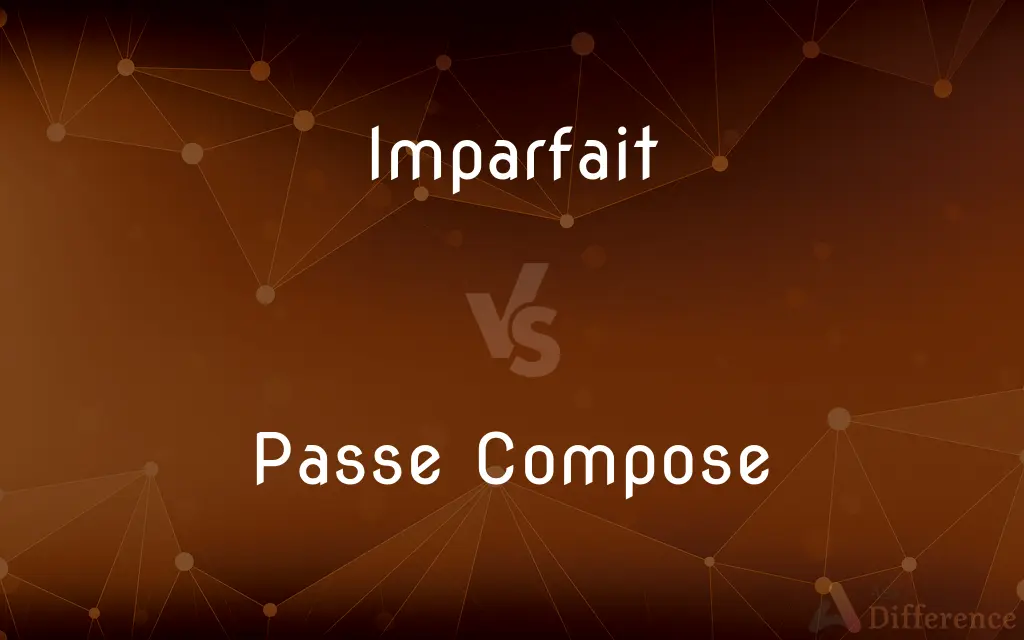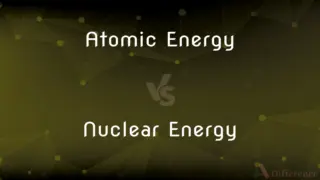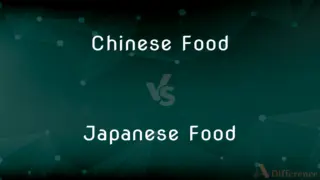Imparfait vs. Passe Compose — What's the Difference?
By Tayyaba Rehman — Published on January 16, 2024
Imparfait is used for ongoing or habitual past actions, while Passé Composé is for completed, specific events in the past.

Difference Between Imparfait and Passe Compose
Table of Contents
ADVERTISEMENT
Key Differences
Imparfait is a French tense used to describe a past state of being or a habitual action in the past. It provides background information and sets the scene in a narrative. Passé Composé, on the other hand, is used to express specific actions that were completed in the past. It highlights events or changes that occurred at a specific time.
The structure of Imparfait is simpler, as it requires only one verb form. For example, "je parlais" means "I was speaking" or "I used to speak." Passé Composé involves two components: an auxiliary verb (either 'avoir' or 'être') and the past participle of the main verb, as in "j'ai parlé" (I spoke).
Imparfait is often used to describe conditions or situations in the past, such as weather, time, age, or feelings. For example, "Il faisait froid" (It was cold). In contrast, Passé Composé is used for actions that have a clear beginning and end, often marked by specific times or dates. For instance, "Il a neigé hier" (It snowed yesterday).
In a narrative, Imparfait is used for ongoing background actions, while Passé Composé is used to advance the story with specific actions or events. For example, "Il lisait (imparfait) quand le téléphone a sonné (passé composé)" - "He was reading when the phone rang."
In summary, Imparfait is used for setting the scene and describing continuing or habitual actions in the past, while Passé Composé is for recounting completed, specific events and actions that advance a narrative.
ADVERTISEMENT
Comparison Chart
Usage
Ongoing or habitual past actions
Completed, specific past events
Structure
One verb form
Auxiliary verb + past participle
Typical Use
Background information, setting the scene
Highlighting specific events or changes
Examples in Narratives
Describes conditions, emotions, settings
Advances the story with key events
Time Reference
Indefinite, habitual duration
Specific, completed duration
Compare with Definitions
Imparfait
Describes ongoing or habitual actions in the past.
Nous marchions tous les jours. (We used to walk every day.)
Passe Compose
Indicates a change of state or condition in the past.
Il est devenu médecin. (He became a doctor.)
Imparfait
Expresses past states of being or feelings.
Elle était heureuse. (She was happy.)
Passe Compose
Used for events or actions with a clear endpoint.
Elle a visité Paris l'année dernière. (She visited Paris last year.)
Imparfait
Used for setting scenes or describing past conditions.
Il faisait beau. (It was beautiful weather.)
Passe Compose
Expresses specific actions completed in the past.
J'ai fini mes devoirs. (I finished my homework.)
Imparfait
Indicates an ongoing action in the past.
Les enfants jouaient dans le parc. (The children were playing in the park.)
Passe Compose
Used for actions completed at a specific time.
Nous avons vu ce film hier. (We saw that movie yesterday.)
Imparfait
Used for actions without a specified completion in the past.
Je lisais souvent ce livre. (I often read that book.)
Passe Compose
Describes actions that advanced a story or narrative.
Le train est arrivé à minuit. (The train arrived at midnight.)
Common Curiosities
What is the main function of Imparfait?
Imparfait describes ongoing or habitual actions in the past and sets scenes.
Can Imparfait and Passé Composé be used in the same sentence?
Yes, they often appear together when setting a background with Imparfait and highlighting specific actions with Passé Composé.
What are the auxiliary verbs used in Passé Composé?
The auxiliary verbs are 'avoir' (to have) and 'être' (to be).
When do you use Passé Composé?
Passé Composé is used for specific, completed actions or events in the past.
Is Imparfait used to describe weather in the past?
Yes, Imparfait is commonly used to describe past weather conditions.
Is Passé Composé used for actions with a clear beginning and end?
Exactly, it's used for actions with a clear start and end point.
Can Imparfait be used for emotions?
Yes, Imparfait is often used to express past emotions or states of being.
Can Imparfait be used for descriptions?
Yes, Imparfait is ideal for describing characteristics or states in the past.
Does Passé Composé have any exceptions in formation?
Yes, some verbs take 'être' as the auxiliary in Passé Composé, and some have irregular past participles.
Can Passé Composé describe a series of completed actions?
Yes, it's often used to describe a sequence of actions that happened in the past.
How is Imparfait formed?
Imparfait is formed using the stem of the first person plural present tense and adding the Imparfait endings.
Does Passé Composé indicate a specific time?
Yes, Passé Composé is often associated with actions at a specific, defined time.
How do you choose between Imparfait and Passé Composé?
Choose Imparfait for ongoing, habitual, or background actions, and Passé Composé for specific, completed events.
Is Imparfait used for actions that repeat?
Yes, Imparfait is used for actions that were repeated or habitual in the past.
Is the choice between Imparfait and Passé Composé always clear-cut?
Not always, context and the nature of the action often determine the appropriate choice.
Share Your Discovery

Previous Comparison
Tartaric Acid vs. Citric Acid
Next Comparison
Atomic Energy vs. Nuclear EnergyAuthor Spotlight
Written by
Tayyaba RehmanTayyaba Rehman is a distinguished writer, currently serving as a primary contributor to askdifference.com. As a researcher in semantics and etymology, Tayyaba's passion for the complexity of languages and their distinctions has found a perfect home on the platform. Tayyaba delves into the intricacies of language, distinguishing between commonly confused words and phrases, thereby providing clarity for readers worldwide.
















































